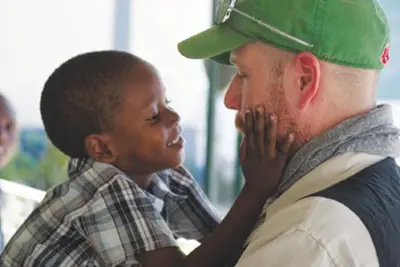Group Spends Spring Break Teaching Science and Math

03/24/2017
By Edwin L. Aguirre
While many students hit the beach, ski or catch up on sleep over spring break, a team from UMass Lowell spent the week teaching more than a hundred schoolchildren in Haiti about astronomy, rocket science, space exploration and the lives of famous scientists, engineers and mathematicians.
Called the “Astronomy Roadshow,” the annual trip is part of the educational outreach program organized by the university’s Haiti Development Studies Center (HDSC), which is based in the port city of Les Cayes, about 200 miles southwest of Port-au-Prince, Haiti’s capital. The center was established in 2013 by Prof. Robert Giles, chair of the Department of Physics and Applied Physics, to engage faculty and students from Haiti and UMass Lowell in research and education as well as solving life-threatening issues such as lack of clean water through affordable, sustainable technologies.
The team was led by physics Asst. Prof. Silas Laycock, who made his third visit to the country since 2015. Joining Laycock were Cecil Joseph, an adjunct physics faculty and staff scientist at UMass Lowell’s Biomedical Terahertz Technology Center, and Thomas Heywosz, a math senior who went on the trip for his Honors College project.
Assisting them in translating Creole and in classroom instruction were Dayana Alabré and Ralph Douyon, two Haitian freshmen English majors enrolled in the university’s online degree program. They live outside Les Cayes and are working in the HDSC as research interns.
“Education is central to our mission,” says Giles. “For students and teachers, the opportunities to make a difference in people’s lives are limitless. The center is a place where research is a pathway to critical change.”
From Black Holes to Mars Landers
The HDSC team brought a variety of materials for experiments and activities for the fifth-, sixth- and 10th-graders at Sainte-Marie des Anges elementary school, including books, posters and game cards.

Online student Dayana Alabré shares her knowledge of the solar system with her young students.
The team also discussed the lives and achievements of influential women and minority astronauts, rocket scientists, physicists, astronomers and mathematicians. By showing the diverse backgrounds of these people, the team hoped to help youngsters gain self-confidence and inspire them to pursue their interests in the STEM fields.
“The students were very respectful, and they asked outstanding questions about the subjects,” notes Heywosz. “On the last day, one class had a student tell us how much they appreciated what we were doing and that they enjoyed all the class activities we did with them.”
For the team’s final session, the members held a seminar for the school’s dozen teachers on how to develop class activities and lesson plans so they can improve their instruction.
A Nation of Possibilities and Challenges
“Visiting Haiti is truly an eye-opening experience. It gives you a sobering perspective on what you have and what is really necessary in life,” says Heywosz. Haiti’s economy and infrastructure were devastated by a powerful earthquake in 2010 and Hurricane Matthew in 2016, and the country has been struggling to recover ever since.

Despite the extreme hardship and poverty, the Haitian people’s resilience, spirit and optimism remain strong.
“The visiting faculty and students from UMass Lowell are part of my success in overcoming learning challenges,” says Alabré, who plans to teach English when she graduates. “They are amazing, hardworking people who believe in a better future for Haiti.”
Alabré says the ideas and teaching methods that the university visitors introduced have made an impact on the school: “The activities inspired the school’s director, Father Leslie, to purchase two telescopes so teachers can host stargazing nights for the students.”
Douyon agrees. “The Astronomy Roadshow has introduced to the Haitian educational system many things that it did not have before, like astronomy,” he says.
“One of the most important things that we do in our workshops is using effective methods of teaching that are widely known in the United States, but new to Haitian teachers. One of these methods is to use common, everyday objects in a practical way for students to learn about astronomy. The Astronomy Roadshow opens the minds of young students to astronomical insights, but does so in ways that make it fun to learn and explore the universe.”



